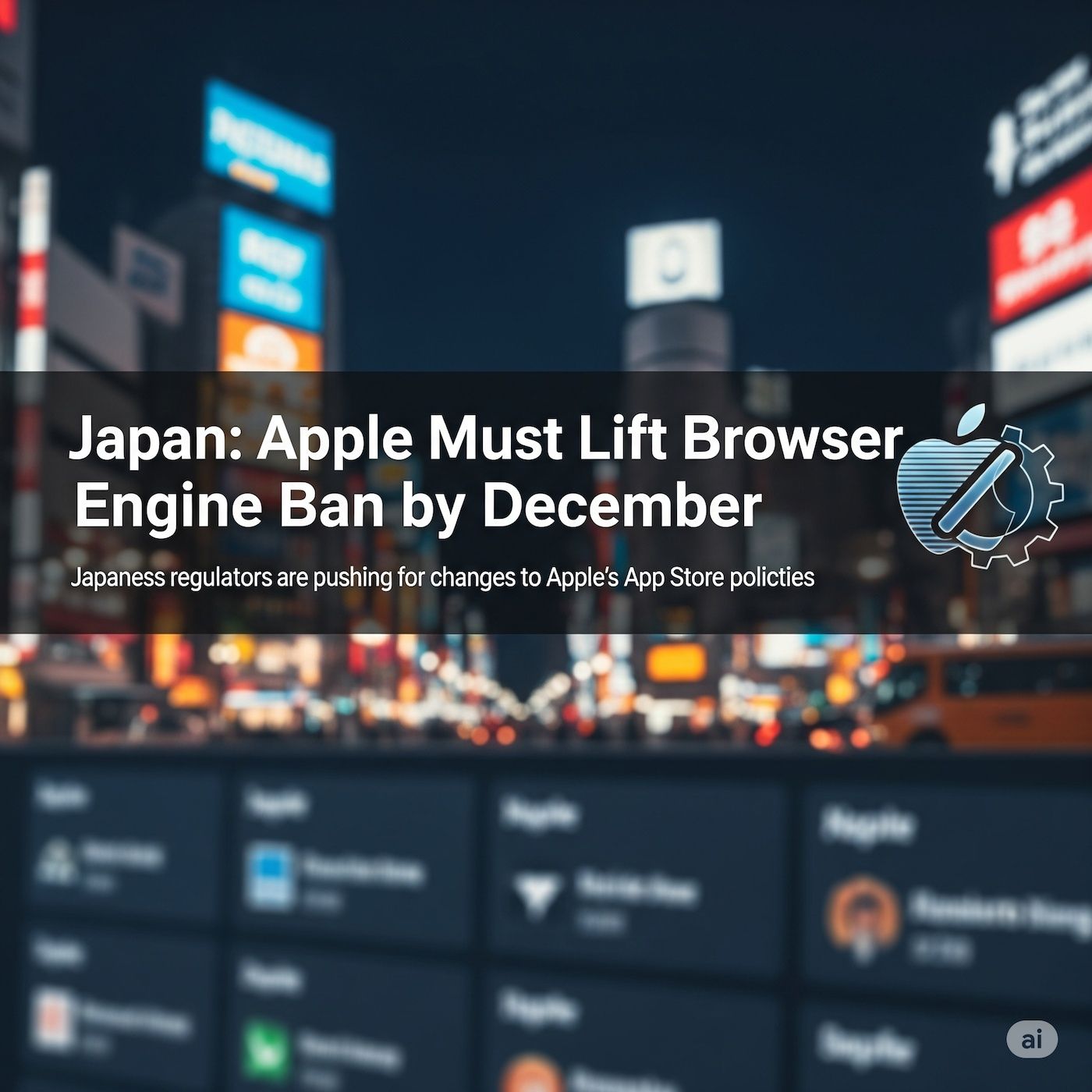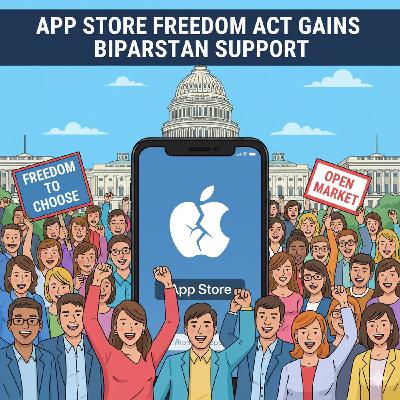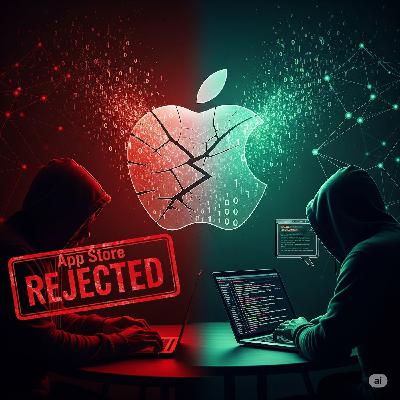Japan says Apple's Must Lift Browser Ban | Billions at Stake, and the Fight for Open Web on iOS
Update: 2025-08-08
Description
Apple's Enduring Browser Engine Ban: A Global Standoff for the Open Web
Description:
In this episode of Upwardly Mobile, we delve into Apple's persistent ban on third-party browser engines on iOS, a restriction that continues to stifle competition and limit the capabilities of web applications. Despite growing global pressure and explicit legal mandates like the EU's Digital Markets Act (DMA), Apple has maintained technical and contractual barriers that make it commercially unviable for other browser vendors like Google and Mozilla to offer their own engines on iOS
. We explore why this ban matters for consumers, developers, and the future of the open internet.
Key Discussion Points:
• The Unique Ban: Apple is the only "gatekeeper" that imposes a ban on third-party browser engines, forcing all browsers on iOS to use its proprietary WebKit engine
. This prevents genuine browser competition and limits the functionality and performance of web apps, hindering their ability to compete with native apps• Apple's Justifications vs. Reality:
◦ Apple claims its restrictions are for security, privacy, and system integrity
. Apple's representatives, like Kyle Andeer and Gary Davis, assert that browser vendors have "everything they need" and have simply "chosen not to" port their engines. ◦ However, critics argue that Apple uses security and privacy as an "elastic shield" for its financial interests
. Evidence does not suggest material differences in security performance between WebKit and alternative engines. Browser vendors, with their strong security track records, could even improve iOS security by competing• Barriers to Entry: The primary obstacles preventing alternative browser engines on iOS include:
◦ Loss of existing EU users: Browser vendors are forced to create entirely new apps, meaning they must abandon current users and start from scratch in the EU
. This single requirement "destroys the business case".
◦ No web developer testing outside EU: Developers globally cannot test their web software on third-party engines on iOS for EU users
.
◦ Hostile legal terms: Apple's contractual conditions are "harsh, one-sided, and incompatible with the DMA"
.
◦ Uncertainty on updates for travelers: Apple has not confirmed that browser updates (including security patches) will not be disabled if an EU user travels outside the EU for more than 30 days
.
• Regulatory Pressure and Compliance:
◦ EU Digital Markets Act (DMA): Explicitly prohibits gatekeepers from requiring the use of their web browser engine.
The DMA demands "effective compliance" and prohibits undermining obligations through technical or contractual means. Despite 15 months, no browser vendor has successfully ported an engine, indicating Apple's non-compliance. ◦ Japan's Smartphone Act (MSCA): Passed and will directly prohibit Apple's ban by December 2025
. Guidelines clarify that actions that hinder adoption, not just outright bans, are prohibited. It also mandates fair API access and prompt choice screens at initial smartphone setup. ◦ UK Competition and Markets Authority (CMA): Provisionally designated Apple (and Google) with "Strategic Market Status," highlighting Apple's browser engine ban and suppression of web app competition
. The UK sees strong enforcement as crucial for economic growth and innovation, especially for startups.• Why Apple Resists: It's fundamentally about protecting revenue
.
◦ Google Search Deal: Safari is Apple's "highest margin product," bringing in $20 billion annually from Google for default search engine status. Losing even 1% browser market share means a $200 million annual revenue loss
.
◦ App Store Revenue: By limiting web app capabilities, Apple protects its App Store revenue, estimated at $27.4 billion in 2024
. Web apps could replace most phone apps, and even a 20% shift could mean a $5.5 billion annual loss for Apple.
◦ User Lock-in: The ban also contributes to user lock-in, making it harder for consumers to switch devices or operating systems, as seen with iMessage
.
• The Path Forward: Regulators and advocates, like Open Web Advocacy, call for firm intervention to compel Apple to make necessary changes
. Key fixes include allowing browsers to update existing apps with their own engines, enabling global web developer testing, granting full hardware and content filtering API access, and allowing third-party browsers to manage and install web apps.
Conclusion: The fight for browser competition on iOS is a global issue, not just a regional one. With the EU, Japan, and the UK now directly addressing Apple's ban, 2026 is poised to be a decisive year in restoring browser competition and ensuring the web remains an open, interoperable platform
.
Sponsor: This episode is brought to you by Approov, ensuring secure mobile API access for your apps. Learn more at approov.io.
Sources/Further Reading:
• "Apple's Browser Engine Ban Persists, Even Under the DMA" - Open Web Advocacy
• "Japan: Apple Must Lift Browser Engine Ban by December" - Open Web Advocacy
• "UK Regulator Flags Apple’s iOS Browser Engine Ban in Draft SMS Designation" - Open Web Advocacy
Keywords: Apple, iOS, Browser Engine Ban, DMA, Digital Markets Act, WebKit, Safari, Open Web Advocacy, Browser Competition, Web Apps, App Store, Google, Mozilla, UK CMA, Japan Smartphone Act, Antitrust, Market Power, Revenue, Gatekeeper, Tech Regulation, Monopoly, Interoperability, Mobile Software Competition Act, SMS.
This content was created in partnership and with the help of Artificial Intelligence AI
Description:
In this episode of Upwardly Mobile, we delve into Apple's persistent ban on third-party browser engines on iOS, a restriction that continues to stifle competition and limit the capabilities of web applications. Despite growing global pressure and explicit legal mandates like the EU's Digital Markets Act (DMA), Apple has maintained technical and contractual barriers that make it commercially unviable for other browser vendors like Google and Mozilla to offer their own engines on iOS
. We explore why this ban matters for consumers, developers, and the future of the open internet.
Key Discussion Points:
• The Unique Ban: Apple is the only "gatekeeper" that imposes a ban on third-party browser engines, forcing all browsers on iOS to use its proprietary WebKit engine
. This prevents genuine browser competition and limits the functionality and performance of web apps, hindering their ability to compete with native apps• Apple's Justifications vs. Reality:
◦ Apple claims its restrictions are for security, privacy, and system integrity
. Apple's representatives, like Kyle Andeer and Gary Davis, assert that browser vendors have "everything they need" and have simply "chosen not to" port their engines. ◦ However, critics argue that Apple uses security and privacy as an "elastic shield" for its financial interests
. Evidence does not suggest material differences in security performance between WebKit and alternative engines. Browser vendors, with their strong security track records, could even improve iOS security by competing• Barriers to Entry: The primary obstacles preventing alternative browser engines on iOS include:
◦ Loss of existing EU users: Browser vendors are forced to create entirely new apps, meaning they must abandon current users and start from scratch in the EU
. This single requirement "destroys the business case".
◦ No web developer testing outside EU: Developers globally cannot test their web software on third-party engines on iOS for EU users
.
◦ Hostile legal terms: Apple's contractual conditions are "harsh, one-sided, and incompatible with the DMA"
.
◦ Uncertainty on updates for travelers: Apple has not confirmed that browser updates (including security patches) will not be disabled if an EU user travels outside the EU for more than 30 days
.
• Regulatory Pressure and Compliance:
◦ EU Digital Markets Act (DMA): Explicitly prohibits gatekeepers from requiring the use of their web browser engine.
The DMA demands "effective compliance" and prohibits undermining obligations through technical or contractual means. Despite 15 months, no browser vendor has successfully ported an engine, indicating Apple's non-compliance. ◦ Japan's Smartphone Act (MSCA): Passed and will directly prohibit Apple's ban by December 2025
. Guidelines clarify that actions that hinder adoption, not just outright bans, are prohibited. It also mandates fair API access and prompt choice screens at initial smartphone setup. ◦ UK Competition and Markets Authority (CMA): Provisionally designated Apple (and Google) with "Strategic Market Status," highlighting Apple's browser engine ban and suppression of web app competition
. The UK sees strong enforcement as crucial for economic growth and innovation, especially for startups.• Why Apple Resists: It's fundamentally about protecting revenue
.
◦ Google Search Deal: Safari is Apple's "highest margin product," bringing in $20 billion annually from Google for default search engine status. Losing even 1% browser market share means a $200 million annual revenue loss
.
◦ App Store Revenue: By limiting web app capabilities, Apple protects its App Store revenue, estimated at $27.4 billion in 2024
. Web apps could replace most phone apps, and even a 20% shift could mean a $5.5 billion annual loss for Apple.
◦ User Lock-in: The ban also contributes to user lock-in, making it harder for consumers to switch devices or operating systems, as seen with iMessage
.
• The Path Forward: Regulators and advocates, like Open Web Advocacy, call for firm intervention to compel Apple to make necessary changes
. Key fixes include allowing browsers to update existing apps with their own engines, enabling global web developer testing, granting full hardware and content filtering API access, and allowing third-party browsers to manage and install web apps.
Conclusion: The fight for browser competition on iOS is a global issue, not just a regional one. With the EU, Japan, and the UK now directly addressing Apple's ban, 2026 is poised to be a decisive year in restoring browser competition and ensuring the web remains an open, interoperable platform
.
Sponsor: This episode is brought to you by Approov, ensuring secure mobile API access for your apps. Learn more at approov.io.
Sources/Further Reading:
• "Apple's Browser Engine Ban Persists, Even Under the DMA" - Open Web Advocacy
• "Japan: Apple Must Lift Browser Engine Ban by December" - Open Web Advocacy
• "UK Regulator Flags Apple’s iOS Browser Engine Ban in Draft SMS Designation" - Open Web Advocacy
Keywords: Apple, iOS, Browser Engine Ban, DMA, Digital Markets Act, WebKit, Safari, Open Web Advocacy, Browser Competition, Web Apps, App Store, Google, Mozilla, UK CMA, Japan Smartphone Act, Antitrust, Market Power, Revenue, Gatekeeper, Tech Regulation, Monopoly, Interoperability, Mobile Software Competition Act, SMS.
This content was created in partnership and with the help of Artificial Intelligence AI
Comments
In Channel























